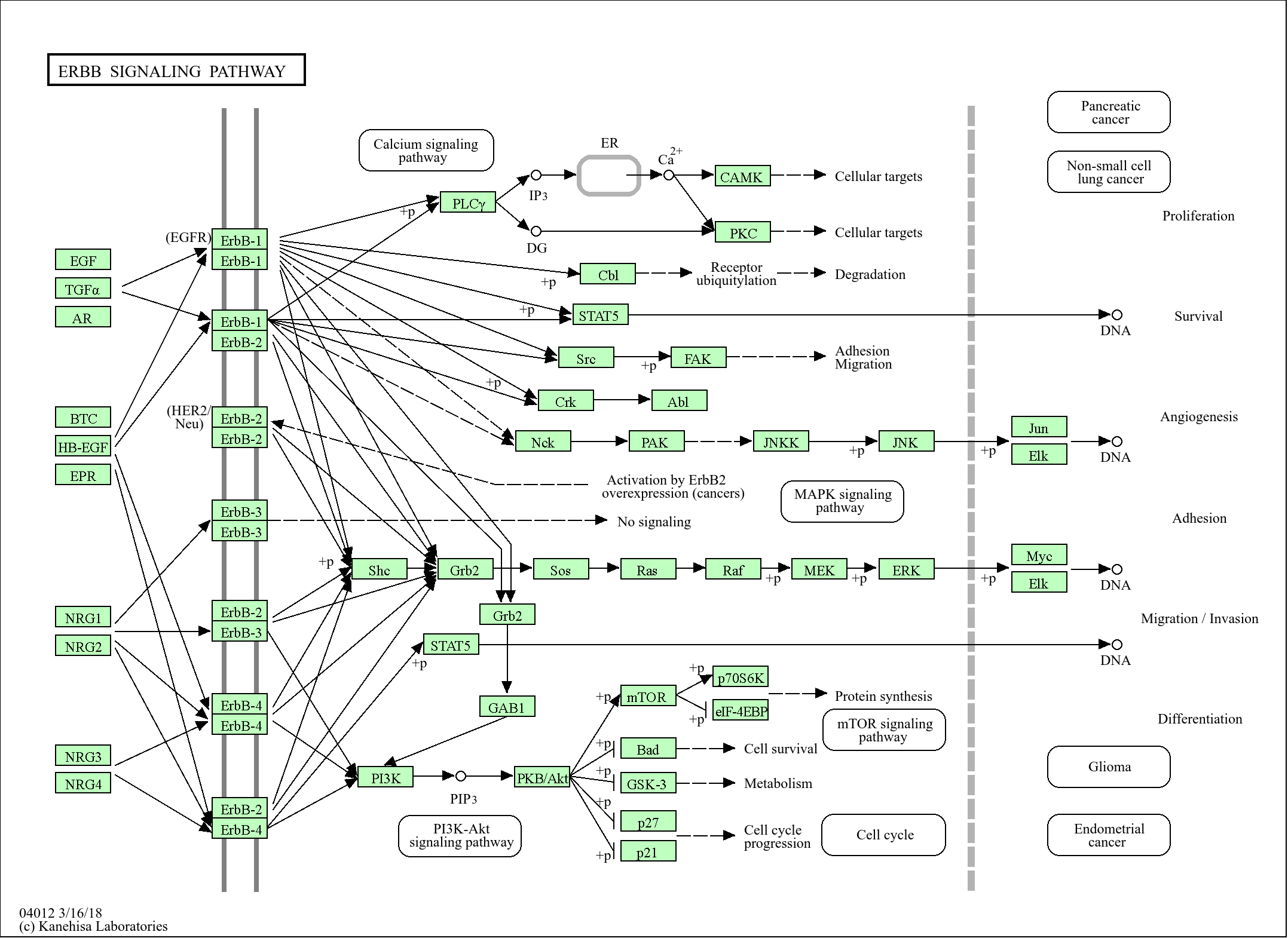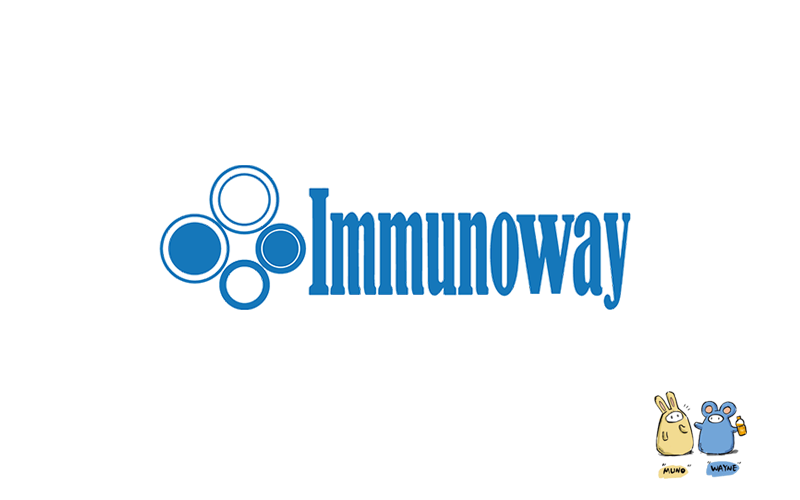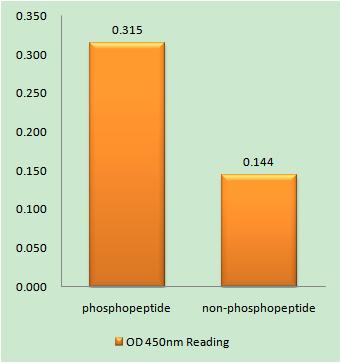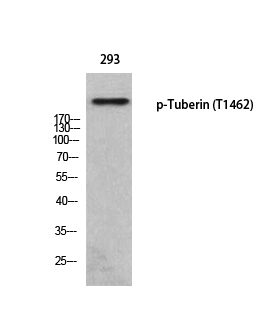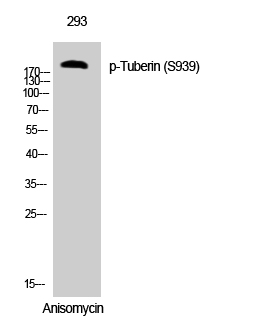
Catalog: YP1538
Size
Price
Status
Qty.
200μL
$600.00
In stock
0
100μL
$340.00
In stock
0
50μL
$190.00
In stock
0
Add to cart


Collected


Collect
Main Information
Target
Tuberin
Host Species
Rabbit
Reactivity
Human, Mouse, Rat
Applications
WB
MW
200kD (Observed)
Conjugate/Modification
Phospho
Detailed Information
Recommended Dilution Ratio
WB 1:1000-2000
Formulation
Liquid in PBS containing 50% glycerol, 0.5% BSA and 0.02% sodium azide.
Specificity
This antibody detects endogenous levels of Human Mouse Rat Tuberin/TSC2 (phospho-Ser1254).The name of modified sites may be influenced by many factors, such as species (the modified site was not originally found in human samples) and the change of protein sequence (the previous protein sequence is incomplete, and the protein sequence may be prolonged with the development of protein sequencing technology). When naming, we will use the "numbers" in historical reference to keep the sites consistent with the reports. The antibody binds to the following modification sequence (lowercase letters are modification sites):SLsVP
Purification
The antibody was affinity-purified from rabbit serum by affinity-chromatography using specific immunogen.
Storage
-15°C to -25°C/1 year(Do not lower than -25°C)
Concentration
1 mg/ml
MW(Observed)
200kD
Modification
Phospho
Clonality
Polyclonal
Isotype
IgG
Related Products
Antigen&Target Information
Immunogen:
Synthesized phosho peptide around human Tuberin(Ser1254)
show all
Specificity:
This antibody detects endogenous levels of Human Mouse Rat Tuberin/TSC2 (phospho-Ser1254).The name of modified sites may be influenced by many factors, such as species (the modified site was not originally found in human samples) and the change of protein sequence (the previous protein sequence is incomplete, and the protein sequence may be prolonged with the development of protein sequencing technology). When naming, we will use the "numbers" in historical reference to keep the sites consistent with the reports. The antibody binds to the following modification sequence (lowercase letters are modification sites):SLsVP
show all
Gene Name:
TSC2 TSC4
show all
Protein Name:
Tuberin/TSC2 (Ser1254)
show all
Other Name:
Tuberin ;
Tuberous sclerosis 2 protein ;
Tuberous sclerosis 2 protein ;
show all
Background:
Mutations in this gene lead to tuberous sclerosis complex. Its gene product is believed to be a tumor suppressor and is able to stimulate specific GTPases. The protein associates with hamartin in a cytosolic complex, possibly acting as a chaperone for hamartin. Alternative splicing results in multiple transcript variants encoding different isoforms. [provided by RefSeq, Jul 2008],
show all
Function:
Alternative products:Additional isoforms seem to exist. Experimental confirmation may be lacking for some isoforms,Disease:Defects in TSC2 are a cause of lymphangioleiomyomatosis (LAM) [MIM:606690]. LAM is a progressive and often fatal lung disease characterized by a diffuse proliferation of abnormal smooth muscle cells in the lungs. It affects almost exclusively young women and can occur as an isolated disorder or in association with tuberous sclerosis complex.,Disease:Defects in TSC2 are the cause of tuberous sclerosis complex (TSC) [MIM:191100]. The molecular basis of TSC is a functional impairment of the tuberin-hamartin complex. TSC is an autosomal dominant multi-system disorder that affects especially the brain, kidneys, heart, and skin. TSC is characterized by hamartomas (benign overgrowths predominantly of a cell or tissue type that occurs normally in the organ) and hamartias (developmental abnormalities of tissue combination). Clinical symptoms can range from benign hypopigmented macules of the skin to profound mental retardation with intractable seizures to premature death from a variety of disease-associated causes.,Function:Implicated as a tumor suppressor. May have a function in vesicular transport, but may also play a role in the regulation of cell growth arrest and in the regulation of transcription mediated by steroid receptors. Interaction between TSC1 and TSC2 may facilitate vesicular docking. Specifically stimulates the intrinsic GTPase activity of the Ras-related protein RAP1A and RAB5. Suggesting a possible mechanism for its role in regulating cellular growth. Mutations in TSC2 leads to constitutive activation of RAP1A in tumors.,online information:TSC2 mutation db,PTM:Phosphorylation at Ser-1387, Ser-1418 or Ser-1420 does not affect interaction with TSC1.,similarity:Contains 1 Rap-GAP domain.,subcellular location:At steady state found in association with membranes.,subunit:Interacts with TSC1 and HERC1; the interaction with TSC1 stabilizes TSC2 and prevents the interaction with HERC1. May also interact with the adapter molecule RABEP1. The final complex contains TSC2 and RABEP1 linked to RAB5 (Probable). Interacts with HSPA1 and HSPA8.,tissue specificity:Liver, brain, heart, lymphocytes, fibroblasts, biliary epithelium, pancreas, skeletal muscle, kidney, lung and placenta.,
show all
Cellular Localization:
Cytoplasm. Membrane; Peripheral membrane protein. At steady state found in association with membranes.
show all
Tissue Expression:
Liver, brain, heart, lymphocytes, fibroblasts, biliary epithelium, pancreas, skeletal muscle, kidney, lung and placenta.
show all
Research Areas:
>>Phospholipase D signaling pathway ;
>>p53 signaling pathway ;
>>Autophagy - animal ;
>>mTOR signaling pathway ;
>>PI3K-Akt signaling pathway ;
>>AMPK signaling pathway ;
>>Longevity regulating pathway ;
>>Cellular senescence ;
>>Thermogenesis ;
>>Insulin signaling pathway ;
>>Thyroid hormone signaling pathway ;
>>Human cytomegalovirus infection ;
>>Human papillomavirus infection ;
>>Herpes simplex virus 1 infection ;
>>Choline metabolism in cancer
>>p53 signaling pathway ;
>>Autophagy - animal ;
>>mTOR signaling pathway ;
>>PI3K-Akt signaling pathway ;
>>AMPK signaling pathway ;
>>Longevity regulating pathway ;
>>Cellular senescence ;
>>Thermogenesis ;
>>Insulin signaling pathway ;
>>Thyroid hormone signaling pathway ;
>>Human cytomegalovirus infection ;
>>Human papillomavirus infection ;
>>Herpes simplex virus 1 infection ;
>>Choline metabolism in cancer
show all
Signaling Pathway
Cellular Processes >> Transport and catabolism >> Autophagy - animal
Cellular Processes >> Cell growth and death >> p53 signaling pathway
Cellular Processes >> Cell growth and death >> Cellular senescence
Organismal Systems >> Endocrine system >> Insulin signaling pathway
Organismal Systems >> Endocrine system >> Thyroid hormone signaling pathway
Organismal Systems >> Aging >> Longevity regulating pathway
Environmental Information Processing >> Signal transduction >> Phospholipase D signaling pathway
Environmental Information Processing >> Signal transduction >> PI3K-Akt signaling pathway
Environmental Information Processing >> Signal transduction >> AMPK signaling pathway
Environmental Information Processing >> Signal transduction >> mTOR signaling pathway
Reference Citation({{totalcount}})
Catalog: YP1538
Size
Price
Status
Qty.
200μL
$600.00
In stock
0
100μL
$340.00
In stock
0
50μL
$190.00
In stock
0
Add to cart


Collected


Collect
Recently Viewed Products
Clear allPRODUCTS
CUSTOMIZED
ABOUT US
Toggle night Mode
{{pinfoXq.title || ''}}
Catalog: {{pinfoXq.catalog || ''}}
Filter:
All
{{item.name}}
{{pinfo.title}}
-{{pinfo.catalog}}
Main Information
Target
{{pinfo.target}}
Reactivity
{{pinfo.react}}
Applications
{{pinfo.applicat}}
Conjugate/Modification
{{pinfo.coupling}}/{{pinfo.modific}}
MW (kDa)
{{pinfo.mwcalc}}
Host Species
{{pinfo.hostspec}}
Isotype
{{pinfo.isotype}}
Product {{index}}/{{pcount}}
Prev
Next
{{pvTitle}}
Scroll wheel zooms the picture
{{pvDescr}}

